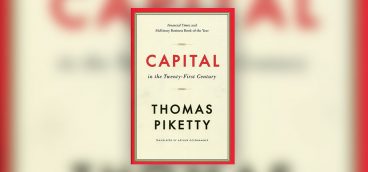
On r > g, Part II
Thomas Piketty’s “Capital in the Twenty-First Century” exploded on the scene in mid-2013, but it’s impact faded quickly. I reviewed last week the widely discussed reasons why Piketty’s book fell from grace, but I also proposed a reason of my own: that Piketty is a naïf. A naïf, for this purpose, is a person who knows his narrow subject …

The Trouble with “Capital”
In the summer of 2013 a remarkable event occurred in the publishing industry. A challenging, 685-page economic text written by an obscure French economist and published by an academic press became an overnight best seller. Thomas Piketty’s “Capital in the Twenty-First Century” (referred to here simply as “Capital”) sold so quickly that Harvard University Press couldn’t keep up …

Examples of What to Say
Even small children love to hear simple stories about their ancestors, and as children grow into teenagers and then young adults the stories can become more complex and serious. For example, consider Great-Grandpa Henry Knox’s many shortcomings as a rancher. Or the general klutziness of the Knox men, who are disposed to walk around with …

Tell the Right Stories to your Children
In the last few posts I’ve spent a lot of time talking about kids who grow up in wealthy families and the issues they face, as well as talking about how virtually all American kids are raised these days. I’ve devoted so much time to these subjects because I want to emphasize the many minefields that surround …

Trust Fund Baby Syndrome: An Interesting Case
In the fall of 1997 I found myself in the spacious, many-windowed living room of a large home in a southern state I’ll call Florida, although that’s not where it was. I have also slightly modified some of the details of the family to protect their privacy. Ostensibly, I was there to discuss more aggressive …

A Pampered Generation
The typical trust fund baby is well-known to all of us: a life devoted to spending down the family’s capital on themselves, not working, having difficulty maintaining relationships, living empty lives. The fear that people will be ruined by money is so pervasive that, following the French Revolution, trusts were abolished in virtually all civil …

Poor Parenting Saps the Wealthy
We are talking in a roundabout way that has taken us back to first principles about the human maturation process and how it interacts with the fear of affluent parents that money will ruin their children. There are several characteristic ways that affluent families go wrong, launching the shirtsleeves-to-shirtsleeves phenomenon that, as Jay Hughes has …

Understanding the Trust Fund Baby
We are talking about the complex process through which infants and children are transformed from little beasts into responsible adults. More particularly, we are talking about how that process often goes wrong and never goes perfectly. In “Civilization and Its Discontents,” for example, Sigmund Freud proposed a…, well, a “Freudian” take on the issue. Freud pointed …

The Talk
No, not that talk. Talking to kids about sex is a walk in the park compared to talking to kids about their family’s money. The worst that can happen with the-birds-and-the-bees conversation is massive parental mortification. The worst that can happen with the money talk, however, is… Well, let’s look into that. For more than a century, …

Make your Plan Now (While You’re Calm)
“Would I say there will never, ever be another financial crisis? I hope that it will not be in our lifetimes and I don’t believe it will be.” –Janet Yellen. Last week I suggested six steps we could take to prepare ourselves for the next market crisis—which, Janet Yellen notwithstanding, will in fact happen. This …

What Will You Do in the Crisis? Part II
“I’m less interested in the return on my money than in the return of my money.” –Mark Twain Whether the markets crash next week or years from now, it’s not too soon to be thinking about how we will navigate the next crisis. With asset prices as high as they are and investor complacency (measured by market volatility) as low …

What Will You Do in the Crisis?
“The world is in the throes of a Bull Market in everything.” –The Economist. No, I am not—not, not, not—predicting a market crash. (On the other hand, if the market collapses just after I post this, I will naturally take credit for calling it.) If I don’t think the markets are going to crash any time …

The Trouble with the Elites
C. P. Snow titled his last book, written shortly before he died, “A Coat of Varnish.” What he meant, as he put it, was that “Civilization is hideously fragile.” Civilization, that is to say, is like a thin coat of varnish spread on top of human savagery. The varnish looks terrific, but scratch it and what …

Europe Fails to Build the New Man
Since human beings settled into communities—that is, since most of us stopped being hunter-gatherers—a primary goal of mankind has been to improve how we are governed. We wanted governments that were more representative, fair, and efficient, governments that could improve our economic circumstances and defend themselves (and us) from outside influence or destruction. We wanted …

The Instability of Europe
Between the first and second world wars, most of the European governments—Britain and, to a lesser extent, France, being exceptions—lived lives that were, to paraphrase Hobbes, weak, unstable, and short. The Weimar Republic in Germany faced existential issues from the beginning. Germany had been humiliated in World War I. It had been burdened with impossibly …

On Populism
Civilization is like a very fine suit of clothes that is just slightly too small for us. The term “populism” derives from the Latin, populus, meaning “people.” It doesn’t mean “people” in the sense of “There are a lot of people who don’t read my blog.” It means “people” in the sense of a nation, a …

Investing in a Rigged Market, Part IV
If we care about the health of free market economies, then we need to care about how efficiently capital is allocated in those economies. And if we care about efficient capital allocation, then we need to care about the health and efficiency of capital markets, because those markets are the principal instruments we have for …

Squeezing out the Investment Experts
The core problems with central bankers, which have led directly to the catastrophes of the Tech Bust, the Financial Crisis, the pathetically weak recovery from the Great Recession of 2008-09, and the near-destruction of the asset management business, are: groupthink, arising out of the fact that every central banker in the world went to the …

The Fed and Friends
We are talking about the traumatizing events that rocked the asset management business, to say nothing of the world, beginning in 2008, a calamity brought to us courtesy of the world’s central bankers. I’ve discussed elsewhere the bizarre strategies of the U.S. Fed and its various doppelgängen at other central banks around the world. But …

Investing in a Rigged Market
The asset management business as we know it today got started in the mid-19th century. The impetus for investment management firms separate from banks arose out of the awkward fact that banks often fail, while asset management firms hardly ever do. According to Nigel Edward Morecroft, who has studied the history of asset management, firms …

To Experts: a Few Words of Wisdom
“I would rather be governed by the first 2,000 names in the Boston phone book than by the Harvard faculty.” –William F. Buckley I began this series of posts by focusing on the annoyance ordinary people experience when they are constantly being told what to do by an ever-proliferating series of experts in almost every field …

Back to the Middle Ages: A Century of “Expertism” in America
The vast Federal regulatory apparatus that we know and love today got its start early in the 20th century under President Woodrow Wilson. Appropriately, Wilson was the only President in U.S. history to earn a PhD–he’d been president of Princeton University. At that time the world still believed that Great Britain was the globe’s most powerful …
Back to the Middle Ages: A Century of “Expertism” in America Read More »
